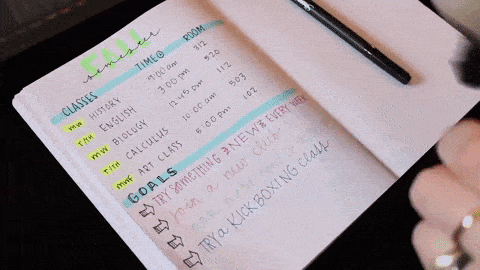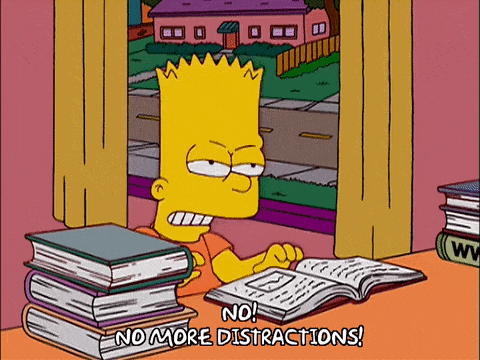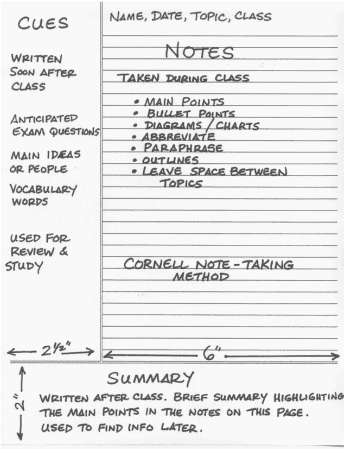What does it take to become a successful college student? What separates high achievers from those that struggle to get ahead? It’s not as complex as you might think.
The most successful students follow daily routines and habits. Between courses, quizzes, exams, and assignments, they know staying focused is hard.
But it’s not impossible, and that’s where great study habits come into play.
Below are the most helpful study habits of highly successful students. These everyday study habits will help you stay on track and perform at the top of your class.
Want to watch a recap of the best study habits? Check out our latest Inversant Insights!
1. Make Time to Study
As a student, you’re always juggling responsibilities. But your time is limited and what you focus on expands. That’s why it’s important to better manage your energy and priorities.
So, how do you do it? With a planner. This was my lifesaver while going to college. The first week of school, I’d grab my syllabus and start writing things down.
- Assignment due dates
- Exam dates
- Quiz dates (sometimes these are hard to plan since you may have a pop quiz)
Any date that was important, I’d write it all in.
Now, before you even ask, yes, I was that student who used a different color highlighter, and pen, to color code my classes. I do recommend doing that. It helped with seeing what was happening for each class all at once.

You’ll also have a better sense of what to expect in all your classes, and how to plan around those dates.
This brings me to my next point, creating micro-goals. You know when your assignments are due, so make simpler to-do items to work yourself up to any bigger project.
2.Organize Your Study Time
You have the planner that’s helping you stay organized. That’s it right? No! You need to continue planning and staying organized to help you succeed.
Set a day out of the week to plan your week ahead and get re-organized.
Every Sunday night, I’d set aside time to plan out my week, and get back on track with organizational habits. Then I’d block the days and times when I’d plan to work on assignments and for what classes.
But the organization doesn’t stop with planning. It involves your physical items too.
- Have a desk? Keep it as clean and organized as you can. A clean area helps improve productivity. An unorganized or messy area can be a distraction.
- Use a backpack? Only have items you need in there. Your binders, or notebooks, pens, paper, highlighters. Throw away any unnecessary paperwork.
- Where do you keep your notes? How do you know what notes are for what class? Have a binder or a notebook for each class. If you want to take it a step further, purchase different color binders or notebooks. It will help with knowing what color goes with what class.
Yes, I was also one of those students who had a binder for every class. In every binder, I had a list of assignments and exams to always remind me of what I needed to do next.
The more you stay organized, the more productive you’ll be.
3. Create a Study Schedule
You may have heard this before, but cramming is never the answer. You may have gotten away with it in the past, but you don’t learn that way.
Cramming only puts information into short-term memory. If you want to learn something, you need to space out your study time. Spacing it out then helps store the information into your long-term memory.
If only you had something where you can plan your study times. ???? Oh, wait! You do! You have your handy planner.
– How to Stick With Study Times?
Schedule your time and make sure to commit to those times. Silence everything and focus on what’s in front of you.
What helped me stick to my study times was a friend who was in the same program as I was. We were taking a lot of the same courses, and we would plan study times together.
That create a lot of accountability, something we all need.
– When is The Best Time to Study?
That’s a hard question to answer.
According to PSB Academy, the best time to study is between the hours of 10 am to 2 pm and 4 pm to 10 pm.
The least effective learning time is between 4 am to 7 am. Even then, it depends on you. Know what works best and stick with it.

I am a morning person. I tend to be more alert in the morning going into the afternoon. I’d set my study times sometime between morning and afternoon.
My brother is a night person. He used to study at nighttime. He would study into the early morning when everyone was still sleeping.
If you already know when the best time for you to study, great. If you don’t, start paying attention to when you’re most alert and plan around that.
4. Design Your Study Space
Your study space is just as important as studying.
I know the bed is comfortable, but it’s not the best place. I am guilty of doing it a few times during my college years.
You want to find a space with no distractions, a place you like, somewhere that’s comfortable (but not too comfortable), with natural lighting.
And remember to silence everything.
Like everything, everyone prefers something different.
You may even have multiple places where you like to study.
I’d go to the school library, a coffee shop near the school, or my house, plus I had a desk in my bedroom.
Whatever place you’ve selected, stick with it. It will become the place you go to the most. It might even become your favorite place.
5. Take the Best Study Notes
If you want to follow successful student habits, that means going to class and taking notes.
Below are some common and effective note-taking techniques:
- Cornell Notes: This method helps to see your main points along with any questions you may have. You would separate your paper into three sections as shown in the image below. You’ll have your notes on the right side, with your main points, questions on the left, and a summary at the end.

- Outlining: This method is like the Cornell Method without the three sections. It involves writing down information to create bullet points. It helps to identify major concepts and jot down sub points below each bullet point. This will only work if you’re able to grasp the main concept during the lecture.
- Mapping: This method works for subjects that have topics connecting to each other to serve as a visual aid. For example, history. You can have a year as your main point and start creating branches of events that happened that year.
- Sentence: This method involves writing sentences down on what the professor says during their lecture. The key to this is writing down important details or what you believe to be important.
The sentence method was the main one I’d use. I purposely set time after class to rewrite my notes and review them.
Some students don’t write notes by hand anymore, though. With the improvements of technology, you can now write notes on your computer or tablet.
Some top apps that can be used for note-taking are:
- Microsoft OneNote
- Apple Notes
- Evernote
- Google Keep
- Simplenote
You can also use Microsoft Word, Google Docs, or Apple Pages for note-taking purposes.
Oh, and don’t forget…
Life happens, you may miss a class or two, so ask someone for their notes if it happens, but don’t let it become a habit.
I recommend getting clarification on anything that you don’t understand as soon as you can. You wouldn’t want to go into an exam or assignment and be confused because of how someone else studies.
6. Get Study Help
You’re in school to learn. You don’t need to struggle when you need help. Your school has many resources you can use to get the answers you need.
A big resource is your professor. Have a question? Raise your hand and ask. Chances are someone else has a similar question.
When you receive your syllabus, they have their email address and office hours there for you to use. If a question comes up while you’re studying, send an email. They’ll tell you on the first day how long it will take to respond.
Need a little more help with a topic? Go during their office hours. I can’t tell you how many of my professors would say students wouldn’t use them.
Depending on what subject you need help with you can go to the tutoring center. In my experience, it’s always math and english tutors that are most available, but check your first week to see what tutors are available for what subjects.
Can I Get Online Study Help?
Companies like Pearson have created an online learning experience for both professors and students to use. Their online content is meant to engage students and motivate them to learn.
If your required textbook is one by a company that has these resources, take advantage of it.
This does mean you’ll need to purchase a new physical copy or purchase an activation code. The code will give you access to an eBook and any other extra content you can use.
The most important thing to remember is that you’re not alone. Don’t be afraid to ask for help.
7. Plan Time for Self-Care
As you can see, school is a lot of work. You might even feel overwhelmed. Taking care of yourself should always be your main priority.
According to the American Institute of Stress, 8 out of 10 students report dealing with frequent stress. With all your planning and studying, who wouldn’t fall into stress?
That’s why it’s important to schedule time for yourself.
I was working part-time and going to school full time, but I still tried to give myself one day a week. One day to decompress and do something fun.
Along with that, I’d schedule small things during the week. I’d go on quick walks, plan a coffee chat with a friend, or read a book.
By taking care of yourself, it helps you manage your stress to be able to deal with everything you juggle.
Some self-care tips you can do are:
- Exercise
- Meditate
- Yoga
- Grab a meal with a friend or fellow student
- Making time to catch up with a friend or family member
It can be something that’s done daily or weekly.
Taking care of yourself also includes getting the proper rest you need. Which should be anywhere between 7 to 8 hours.
School is hard work, but that doesn’t mean you shouldn’t take care of yourself. Your health should always be your main priority.
Share and Pin!

Final Thoughts
College courses can be tough, but they don’t have to be overwhelming.
As long as you stay up to date on your workload you can easily manage and be a successful student.
If you’d like to hear about other ways to be a successful student, join our Facebook Live series, Inversant Insights.
Every other week, we share tips and tools to get to and through college – without an overwhelming amount of student loan debt.

